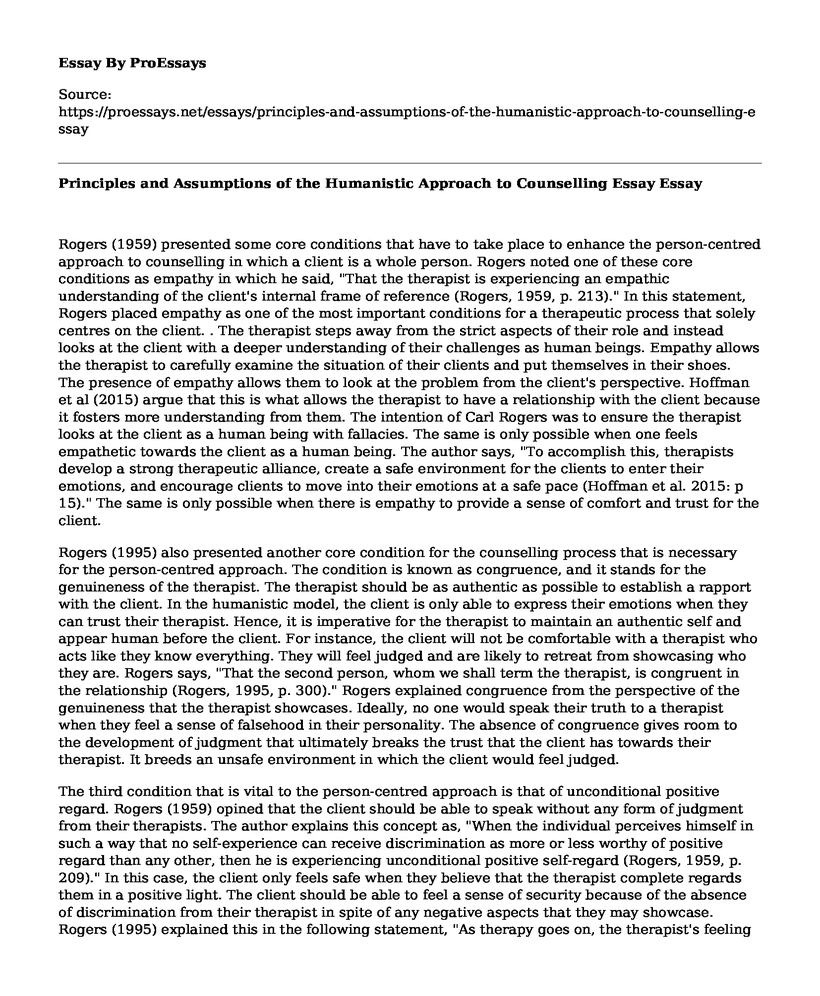Rogers (1959) presented some core conditions that have to take place to enhance the person-centred approach to counselling in which a client is a whole person. Rogers noted one of these core conditions as empathy in which he said, "That the therapist is experiencing an empathic understanding of the client's internal frame of reference (Rogers, 1959, p. 213)." In this statement, Rogers placed empathy as one of the most important conditions for a therapeutic process that solely centres on the client. . The therapist steps away from the strict aspects of their role and instead looks at the client with a deeper understanding of their challenges as human beings. Empathy allows the therapist to carefully examine the situation of their clients and put themselves in their shoes. The presence of empathy allows them to look at the problem from the client's perspective. Hoffman et al (2015) argue that this is what allows the therapist to have a relationship with the client because it fosters more understanding from them. The intention of Carl Rogers was to ensure the therapist looks at the client as a human being with fallacies. The same is only possible when one feels empathetic towards the client as a human being. The author says, "To accomplish this, therapists develop a strong therapeutic alliance, create a safe environment for the clients to enter their emotions, and encourage clients to move into their emotions at a safe pace (Hoffman et al. 2015: p 15)." The same is only possible when there is empathy to provide a sense of comfort and trust for the client.
Rogers (1995) also presented another core condition for the counselling process that is necessary for the person-centred approach. The condition is known as congruence, and it stands for the genuineness of the therapist. The therapist should be as authentic as possible to establish a rapport with the client. In the humanistic model, the client is only able to express their emotions when they can trust their therapist. Hence, it is imperative for the therapist to maintain an authentic self and appear human before the client. For instance, the client will not be comfortable with a therapist who acts like they know everything. They will feel judged and are likely to retreat from showcasing who they are. Rogers says, "That the second person, whom we shall term the therapist, is congruent in the relationship (Rogers, 1995, p. 300)." Rogers explained congruence from the perspective of the genuineness that the therapist showcases. Ideally, no one would speak their truth to a therapist when they feel a sense of falsehood in their personality. The absence of congruence gives room to the development of judgment that ultimately breaks the trust that the client has towards their therapist. It breeds an unsafe environment in which the client would feel judged.
The third condition that is vital to the person-centred approach is that of unconditional positive regard. Rogers (1959) opined that the client should be able to speak without any form of judgment from their therapists. The author explains this concept as, "When the individual perceives himself in such a way that no self-experience can receive discrimination as more or less worthy of positive regard than any other, then he is experiencing unconditional positive self-regard (Rogers, 1959, p. 209)." In this case, the client only feels safe when they believe that the therapist complete regards them in a positive light. The client should be able to feel a sense of security because of the absence of discrimination from their therapist in spite of any negative aspects that they may showcase. Rogers (1995) explained this in the following statement, "As therapy goes on, the therapist's feeling of acceptance and respect for the client tends to change something approaching awe as he sees the valiant and deep struggle of the person to be himself (Rogers, 1995, p. 69)." In this statement, Rogers explained that unconditional positive regard allows the therapist to move from a place of judgment into one that accepts the client as a person. They see themselves through the eyes of the client because of this point of acceptance. Rogers et al (1989) further expounded on this concept by saying, "It means that there are no conditions of acceptance, no feelings of I like you only if you are thus and so (Rogers, et al. 1989, p. 225."
References
Hoffman, L., Vallejos, L., Cleare-Hoffman, H.P. and Rubin, S., 2015. Emotion, relationship, and meaning as core existential practice: Evidence-based foundations. Journal of Contemporary Psychotherapy, 45(1), pp.11-20.
Kramer, R., 1995. The Birth of Client-Centered Therapy: Carl Rogers, Otto Rank, and" The Beyond". Journal of Humanistic Psychology, 35(4), pp.54-110.
Rogers, C. R., Kirschenbaum, H., & Henderson, V. L. 1989. The Carl Rogers reader. Boston, Houghton Mifflin.
Rogers, C.R., 1959. A theory of therapy, personality, and interpersonal relationships: As developed in the client-centered framework (Vol. 3, pp. 184-256). New York: McGraw-Hill.
Rogers, C.R., 1995. On becoming a person: A therapist's view of psychotherapy. Houghton Mifflin Harcourt.
Schneider, K.J. and Krug, O.T., 2010. Existential-humanistic therapy. Washington, DC: American Psychological Association.
Cite this page
Principles and Assumptions of the Humanistic Approach to Counselling Essay. (2022, Jun 06). Retrieved from https://proessays.net/essays/principles-and-assumptions-of-the-humanistic-approach-to-counselling-essay
If you are the original author of this essay and no longer wish to have it published on the ProEssays website, please click below to request its removal:
- Bob's Psychological Profile from the Movie What About Bob?
- Essay Sample on Mental Health and Depression
- Worldview Analysis and Personal Inventory Paper Example
- Brain Maturation in Adolescence and Cognitive and Intuitive Thinking Paper Example
- Life Experiences: Our Biology, Our Choices - Essay Sample
- Paper Example on Heart Rate Variability & PTSD: A Clinical Review
- Essay Example on Corporal Punishment: 50-65% of Parents Use It for Toddlers and Teens







